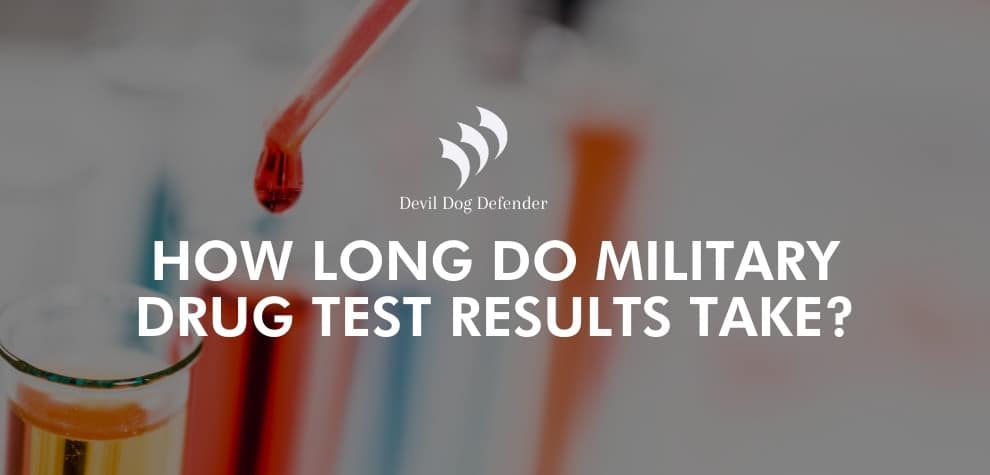
Military drug tests are very serious, as the military has the ability to prosecute someone based on failed drug tests. Whether the drug test was random or targeted, the period of waiting for results varies, depending on certain factors. At The Wilkie Law Group, we offer experience and diligence when dealing with military defense cases. Aden Wilkie’s extensive knowledge and winning record make him the perfect attorney for your drug defense case.
If you took a drug test and are a member of the military, you might not be familiar with the process of receiving your results. In this post, our military drug crime attorney at The Wilkie Law Group will explain everything you need to know about getting a drug test, submitting it, and receiving your results from a military drug testing lab.
How Are Drug Test Samples Tested?
Lab technicians generally examine military drug test samples by gas chromatography and mass spectrometry. This process uses a dormant gas to carry the urine sample through columns to separate it. The sample breaks down by boiling point, as well as its tendency toward liquid or gas states. Once the compounds break down, technicians bombard the sample with electrons. The process produces a specific molecular identifier which a mass spectrometer reads.
These results are highly precise. Drug detection windows are very important, especially if you are in reserve. Sometimes, court-martials won’t convict a reservist unless the drug use occurred while on duty. Below, we list common factors that affect drug detection windows.
- How much fluid you took in prior to your drug test
- Your method of drug ingestion
- How much of the drug you ingested
- Your drug usage history
- Physical fitness and physical conditions
- The half-life of the drug, as well as metabolism
How Long Do Military Drug Test Results Take?
On average, at least one day passes between the time a testing lab receives the sample and the time they post the results to a web portal. At maximum, this process takes around 5-7 days. Usually, negative results post more quickly than positive results, as there is less work to be done.
What Happens If I Fail the Drug Test?
If you fail the drug test, you may be subject to certain punishments. These punishments include court-martial, nonjudicial punishment, and administrative separation. The action taken depends on a few factors, such as military branch, rank, and commanding officer.
Learn more about How to Fight a Positive Drug Test in the Military here.
What Are My Commander’s Options for Taking Action?
A commander, in the event of a positive drug test, has several options for taking action. Depending on the specific circumstances of the test, as well as the commander’s own personality, any of the below actions are possible. Here, we outline the most common occurrences after a positive test.
Court Martial
This is the legal process for military members. There are three levels of courts-martial, each increasing in severity. Generally, commanders reserve courts-martial for very serious drug offenses.
Summary court-martial (SCM)
This involves only one officer serving as both judge and jury. It also involves only enlisted personnel, and minor offenses. Sentences range from up to 1 month in confinement, forfeiture of pay, and rank reduction.
Special court-martial (SPCM)
This involves a panel of at least three members, as well as a judge. A special court-martial is comparable to civilian misdemeanor courts. They impose any punishment except for the following: death, dishonorable discharge, confinement for over a year, dismissal, and several others. More recently we have seen the advent of a variant of the Special court-martial. It is commonly known as the “short martial.” It is becoming more popular with Commanders. Reason being, unlike a regular SPCM, the “short-martial” is quicker because it is a trial with a military judge alone, no option for members. In return for taking away the option of members (jury) a punitive discharge may not be awarded at a “short-martial.” Overall the punishments are less, though if convicted you still receive a federal misdemeanor conviction.
General court-martial (GCM)
This consists of a panel of at least three members, as well as a judge. General courts-martial are comparable to felony civilian courts. They have the right to deliver any non-prohibited punishment, including death in specific situations. Rarely is a General court-martial used as the forum for drug use. Typically if a drug case is being sent to a GCM it is accompanied by something more serious (e.g., charges for aggravated assault or any other felony-level misconduct).
Nonjudicial punishment
This punishment is known by many names, including “Article 15,” “Office Hours,” and “Captain’s Mast.” Commanders generally issue non-judicial punishment for minor offenses. Punishments include confinement on lowered rations, restrictions to certain limits, arrest in quarters, correctional custody, extra duties, pay forfeiture, grade reduction, and pay detention. Typically Commanders will “convince” a junior military member to “accept” NJP only to turn around and use the evidence of guilt from the NJP at a follow-on Ad Board.
Administrative separation
This is comparable to being fired from a job. A commander wishes to separate you through an administrative process. All soldiers identified to be abusing drugs after a positive urinalysis test will be processed for separation. Processing for drug use is mandatory. But, with a good lawyer separation is not certain.
Reserve
Unless the reservist used drugs while on duty, they may not receive punishment.
Will I Be Processed for Separation?
If you had a positive urinalysis case, yes. Your commanding officer has the authority to decide if the positive result was wrongful or not. Additionally, processing is mandatory when someone admits to drug use, has more than one drug-related offense, or pled no contest in civilian court.
What Are Common Defenses I Can Use?
An experienced military defense lawyer will know the best and most common defenses used in drug abuse cases. At The Wilkie Law Group, we have extensive knowledge of the defenses available to you. In this section, we’ll outline the defenses we are most likely to consider.
- Laboratory error: Even in a controlled laboratory setting, people make mistakes. These mistakes could have an impact on your lab work, which leads to an impact on your test results. Laboratory errors include cross contamination, leaking, diluted samples, incorrect paperwork, false positives, and more.
- Switched samples: Mishandling of samples happens sometimes. As we stated before, mistakes happen, even in labs. Your sample might have been contaminated by or switched with someone else’s, and so your results are not what they should be.
- Unconstitutional testing: Different circumstances exist in which commanders engage in deception to drug test someone. A lack of probable cause for testing is also a possibility. Enlisting the help of a highly experienced legal counsel is essential in these cases.
- Unknowing ingestion: It is also possible for someone to unknowingly ingest an illegal drug or contraband. Drug use is not wrongful or illegal if you do not have knowledge of ingesting it or of its contraband nature.
Chain of Custody
The Unit’s handling of the drug prior to arrival at the Drug Lab may also provide avenues of attack on your urinalysis.
The chain of custody of the urine must be solid from the moment it leaves your body to the moment of testing in the lab. Many savvy attorneys defeat drug cases by identifying shortcomings with a command’s drug program. They also point out failures in the conducting of the urinalysis on the date of the sample collection. Whether it be poor accountability in observing the urine leaving the body, poor procedures in accounting for the bottle at the table, and process in putting the sample in boxes for shipment.
Other issues may arise in the storage and shipping methods used by the unit to get the samples to the lab. A good defense attorney will look at all aspects of the chain of custody. They will find any holes or errors that break that chain. A good attorney creates sufficient reasonable doubt as to the accuracy of the sample tested at the lab being your urine and not someone else’s.
Should I Hire an Attorney?
Attorney Aden Wilkie provides essential advice for all military-related cases. His extensive gathering of evidence, years of experience, and military background provide him with the tools to fight your case. If you’re a service member facing drugs charges, you need the Devil Dog Defender on your side. For a consultation on your case, call 910-333-9626 today or visit our website to learn more.
Located in Jacksonville, Wilkie serves the entire state of North Carolina as well as its surrounding states. He is also able to service any military installation located in the United States, but travel fees will apply. If you’re located at Fort Bragg, Camp Lejuene, or any other military installation, get the Devil Dog Defender on your side today.




